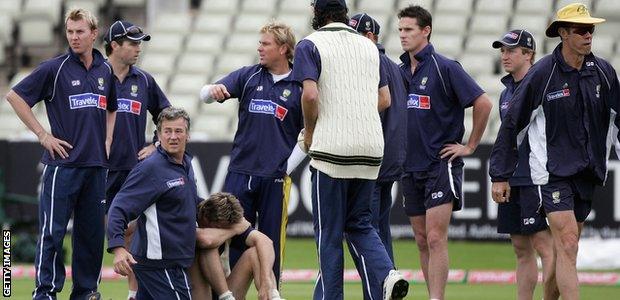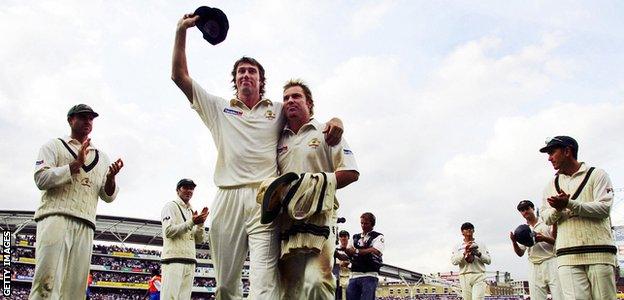From the Ashes: Glenn McGrath on what happened after his 2005 injury at Edgbaston
- Published

From the Ashes is a new series of features and podcasts which dig deeper into tales of pain, despair and sometimes triumph in cricket's fiercest and most storied Test series.
Glenn McGrath's mis-placed step onto a cricket ball lying on the Edgbaston outfield in the hours before the second Test of 2005 is etched into Ashes lore.
It is a sporting sliding-doors moment up there with the overthrows deflected off Ben Stokes' bat in the 2019 World Cup final, Geoff Hurst's second goal being awarded by the linesman in 1966, and Babe Ruth deciding there was more money in hitting than pitching.
The two Tests missed by one of the greatest fast bowlers to ever play the game - McGrath also sat out the fourth at Trent Bridge with an elbow problem - were won by England by margins of only two runs and three wickets, famously giving them a first Ashes series win in 18 years.
Until Edgbaston, McGrath and Australia were flying.
Yes, England's fresh and fearless attitude under Michael Vaughan had rattled the Aussies in the first Test at Lord's, but the tourists still won by 239 runs. McGrath took nine wickets in the match, including his 500th in Test cricket, celebrating the landmark by pulling on a pair of garish gold boots.
Mining boots would have been more use to McGrath that morning in Birmingham when, for some reason, the Australians arrived early for the first day of the second Test.
"Routines are very important to cricketers, routines are very important to me, but we changed our routine before that game," McGrath, now 53, tells BBC Sport.
"I normally get out just in time for the warm-up to start, then off you go. On this day, our coach John Buchanan decided to leave half an hour earlier than we would normally do. When we got out ready to go, there was still half an hour before the warm-up started.
"We had a look at the pitch and were standing around chatting. Brad Haddin picked up a rugby league ball and we were passing it back and forth. He rates himself, but threw a rubbish pass that bounced halfway and rolled along the ground.
"I turned to pick the ball up, but what I hadn't seen were the cricket balls that had been put out for when we did start the warm-up. My first step was on the ball. I still don't remember seeing it, but I remember feeling it.
"To think if we'd just stuck to the normal routine."

Glenn McGrath is crestfallen after standing on a stray cricket ball which would lead to him being ruled out of the 2005 Ashes Test at Edgbaston
McGrath was carted off the outfield and straight to hospital for a scan that revealed two ruptured ligaments and bone damage in his right ankle. He got back to Edgbaston just in time to hear the stadium announcer telling the crowd he was out of the Test.
Ordinarily, the injury would have put him on the shelf for six weeks. Australia physio Errol Alcott immediately told the press McGrath would miss the third Test the following week. With his participation in the series hanging in the balance, McGrath had to watch England win one of the most dramatic Tests of all time.
"It was tough sitting there watching," he says. "Not so much that we lost, but I always wonder what positive impact could I have had on the team.
"It's not so much the bowling impact, it's the impact on the mental state of the opposition. All of a sudden, I'm not playing. I'd bowled well at Lord's, then I'm out, which gives a lift to the opposition that wouldn't have been there otherwise."
How Australia could have used McGrath's metronomic accuracy when England were piling up 407 on the first day, or when Andrew Flintoff was counter-attacking on day three.
It was McGrath's replacement Michael Kasprowicz who was the last man to fall on a heart-stopping Sunday morning. Kasprowicz had made 20 in a last-wicket stand of 59 with Brett Lee when he gloved Steve Harmison down the leg side to give England victory by two runs, their narrowest win in terms of runs in Test history.
"If we had got those last three runs, it would have killed the series there and then," says McGrath. "England's confidence would have been shattered."
Glenn McGrath | Tests | Wickets | Average |
|---|---|---|---|
v England | 30 | 157 | 20.92 |
Career | 124 | 563 | 21.64 |
By this point, though, McGrath and Alcott were working hard to get the paceman back to fitness. McGrath was even waking up through the night to have treatment.
In the run-up to the third Test at Old Trafford, the Australians visited Manchester United, which was when McGrath first started to jog (he also swapped shirts with Ryan Giggs). Seven days after stepping on the ball at Edgbaston, McGrath was back playing Test cricket.
"Cricket and bowling is all about straight lines. If I had to dodge and weave, I would have had no chance," says McGrath. "I definitely wasn't 100%, but I felt I was good enough."
His 0-86 was the only time in 14 Tests in England that McGrath failed to take a wicket in the first innings. Though he picked up five in the second, he was aided by England's push for quick runs. The 5.52 runs an over he conceded was the worst economy from a spell of more than seven overs in McGrath's entire Test career.
"I thought I bowled OK, but compared to Lord's, I was not quite the same bowler," he says.
McGrath at least survived nine deliveries at number 11 as Australia clung to a draw on a fifth day when thousands of spectators were locked out of a bursting Old Trafford. He had played his part in keeping the series level, only for injury to strike again prior to the fourth Test at Trent Bridge.
"I physically couldn't bowl because of the pain my elbow was in," he says.
"It came from nowhere and I don't know where it went to because a couple of days later I was fine. It was just that morning of the match, I could not bowl."
Whether or not the elbow problem was a result of over-compensating for the injured ankle, McGrath's absence was again critical for the Australians, who had also been forced to drop his out-of-form new-ball partner Jason Gillespie.
As England nervously chased 129 to win in Nottingham, Kasprowicz and debutant Shaun Tait were targeted for a combined 43 runs from their six overs. Lee and Shane Warne were left to shoulder the attack and shared seven wickets to almost bowl Australia to an Ashes-saving victory.
"Straight after the Test and in the years that followed, Warney always said if we had 20 more runs we would have won," says McGrath.
McGrath returned for the fifth and final Test at The Oval. As Australia pushed for the win that would have denied England the urn, he removed Vaughan and Ian Bell with successive deliveries on the final day, only for an inspired Kevin Pietersen to make a maiden Test century that sealed the Ashes.
McGrath had tasted defeat in an Ashes series for the first and only time, leaving The Oval outfield arm-in-arm with Warne in what would be their final Test in England.
"It was a bittersweet moment," he says. "It was tough sitting watching those Tests and not playing, but the impact that series had on the game itself was brilliant."

Glenn McGrath and Shane Warne took 352 Ashes wickets between them
McGrath had been the scourge of England batters and would be again, claiming 21 wickets in the 2006-07 5-0 clean sweep, his last Test series before retirement.
As for 2005, tiny margins decided perhaps the greatest series ever. McGrath, a man who took 87 wickets at an average of 19.34 in England, was relegated to a role on the periphery.
"I'm not going to sit here and say we would have won, it may have been exactly the same," he says.
"I loved playing cricket in England. The conditions over here suited me down to the ground. It was perfect.
"I like to think I would have had a positive impact on the team, but we'll never know."
The men's Ashes begins on 16 June, with the multi-format women's Ashes getting under way six days later. BBC Sport will have comprehensive coverage across TV, radio and online of both series.